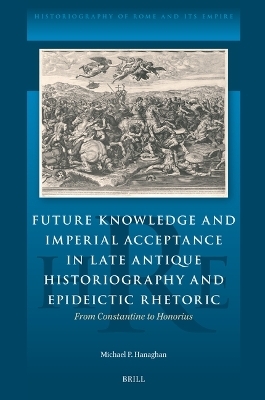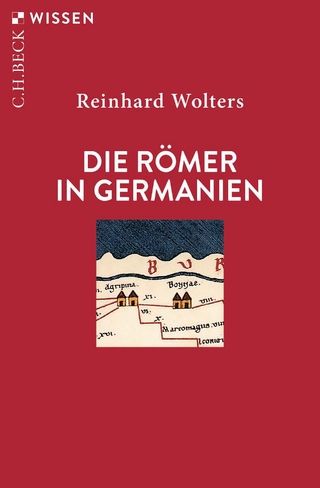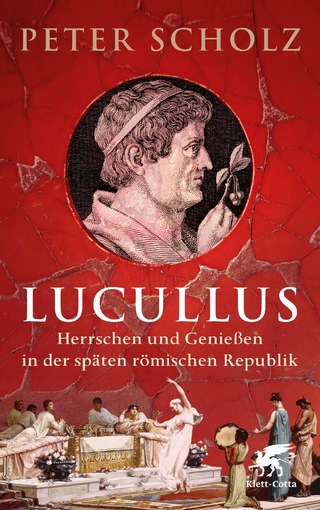
Future Knowledge and Imperial Acceptance in Late Antique Historiography and Epideictic Rhetoric
Brill (Verlag)
978-90-04-71478-6 (ISBN)
- Lieferbar (Termin unbekannt)
- Versandkostenfrei
- Auch auf Rechnung
- Artikel merken
This book analyses late antique historiography and epideictic texts, focusing on how divine knowledge of imperial futures safeguarded the legitimacy of Roman emperors. It begins with Constantine and his tetrarchic colleagues (A), before moving to Constantius II and Julian (B), then Valens (C), and ending with Theodosius and Honorius (D).The impact of future knowledge in these texts could be felt both in the present circumstances of their composition and in perpetuity, as visions of the future reflect either the confidence or boastful arrogance of history’s protagonists, their divine inspiration or doom, and ultimately, their place in imperial memory.
Michael P. Hanaghan, Ph.D.(2015), Sydney, is Senior Research Fellow at the Institute for Religion and Critical Inquiry, Australian Catholic University, Melbourne. He has published predominantly on Late Antique literature, including numerous articles and the monograph Reading Sidonius’ Epistles (CUP, 2019).
Historiography of Rome and Its Empire Series
Preface
Acknowledgments
Introduction
1 Forms of Future Knowledge in Late Antiquity
2 The Politicisation of Future Knowledge
3 Late Antique Historiography and Epideictic Rhetoric
4 Divine, Future Knowledge and Imperial Representation
5 The Acceptance Model and Divine, Future Knowledge in Late Antiquity
6 Scope
Part 1: Constantine and the Tetrarchy
1 A Metamorphosis from Pan. Lat.7(6) to 4(10)
1 Introduction
2 Pan. Lat. 7(6) Constantine’s Marriage to Fausta
3 Pan. Lat. 6(7) and Constantine’s Vision of Apollo
4 Pan. Lat. 12(9) and Constantine’s Victory at the Milvian Bridge
5 Conclusion
2 Divine Acceptance in Lactantius’ De mort. pers.
1 Introduction
2 Diocletian, Galerius, and the Beginning of the Great Persecution
3 Constantine, Maxentius, and the Battle of the Milvian Bridge
4 Licinius, Maximin Daza and the Battle of Tzirallum
5 Conclusion
3 Divine Acceptance in Eusebius’ Historia Ecclesiastica
1 Introduction
2 Dating Books 8–10
3 Eusebius’ Introduction of Maxentius and Maximin Daza in Book 8
4 Parallel Defeats and the Failure of Pagan Divine Knowledge in Book 9
5 Licinius: the Final Tyrant, a First Attempt in Book 10
6 Conclusion
4 Imperial Memory in Eusebius’ Epideixeis (De laud. Const. and Vit. Const)
1 Introduction
2 Constantine, Christ, and Future Knowledge in Eusebius’ De laudibus Constantini
3 The Great Persecution and Constantine’s Escape
4 Maxentius, Licinius, and Eusebius’ Historical Revisionism
5 Conclusion
Part 2: Constantius II and Julian
5 Julian’s Divination in Libanius’ Contemporary Discourse (Or. 13, 12, 15)
1 Introduction
2 Julian’s Rise and the Announcement of Constantius’ Death (Or. 13)
3 Constantius vs Julian, Augustus and Sacrificial Priest (Or. 12)
4 Philanthropia and the Friendship of the Gods (Or. 15)
5 Conclusion
6 Gregory Nazianzus’ Creation of a Discourse against Julian (Or. 4–5)
1 Introduction
2 Paideia, Rhetoric and Gregory’s Historicising Ambition (Or. 4)
3 Julian’s Katabasis, Mock Epic and the Making of Imperial Memory
4 The Destruction of the Temple in Jerusalem in Or. 5
5 Julian’s Death and the Failure of Divine Knowledge in Or. 5
6 Conclusion
7 Remembering Julian in Libanius’ Retrospection (Or. 18)
1 Introduction
2 The Date of Or. 18 and Its Relationship to Gregory Nazianzus’ Or. 4 and 5
3 Julian’s Success in Gaul
4 Julian’s Acclamation
5 The Death of Constantius
6 Julian’s Persian Campaign
7 Conclusion
8 Ammianus’ Constantius II and Julian; Divine Acceptance and the Politics of Rome
1 Introduction
2 Constantius’ Anxious Paranoia (Amm. Marc. 14–19)
3 Julian vs Constantius (Amm. Marc. 20–21)
4 Constantius’ Legislation against Divination and His Legacy
5 Constantius and the Altar of Victory
6 Conclusion
9 Ecclesiastical Historiography and the Denial of Julian’s Divine Acceptance
1 Introduction
2 The Martyrion of St. Babylas and the Temple of Apollo
3 The Martyrion of St. Mammas
4 The Destruction of the Temple in Jerusalem
5 Julian’s Body, Christ’s Coffin, and the Embodiment of Imperial Memory
6 Julian’s Funerary Procession and the Display of Imperial Unacceptance
7 Conclusion
Part 3: Valens
10 Ammianus’ Valens: Antioch, Thrace, and the Barbarian Future of Rome
1 Introduction
2 Valentinian I and the Treason Trials at Rome
3 The Magic Trials at Antioch and Valens’ Failure to Obtain Elite Acceptance
4 Barbarians in Thrace and the Shades of Valens’ Victims
5 Conclusion
11 Antioch to Adrianople in the Nicene Criticism of Valens’ Acceptance
1 Introduction
2 Socrates Scholasticus, Sozomen, and the Denial of Valens’ Divine Acceptance
3 Christian Predictions and the Battle of Adrianople
4 Conclusion
Part 4: Theodosius and Honorius
12 Theodosius and the Battle of the Frigidus in Ecclesiastical Historiography
1 Introduction
2 Eugenius and Flavianus’ Divinatory Knowledge
3 John of Thebes, a Christian Counter-Prediction
4 Eugenius’ Death
5 Conclusion
13 The Antitheses of Honorius’ Court: Rufinus, Gildo, and Eutropius in Claudian’s Epic-Epideixeis
1 Introduction
2 Rufinus, Magic, and the Forbidden Divine Knowledge of the Gods
3 Rome’s Recent Past and Gildo’s Future
4 Eutropius: Omen, Seer, Sacrifice, and a Political and Divine Anathema
5 Conclusion
14 Honorius, Stilicho, and Divine Acceptance in Claudian’s Panegyrics
1 Introduction
2 Stilicho’s First Consulship and the Shadow of Eutropius
3 Stilicho and the Gothic War
4 Claudian’s Panegyrics for Honorius’ Fourth and Sixth Consulships
5 Conclusion
Epilogue
Appendix: Timeline
Bibliography
Index
| Erscheinungsdatum | 05.03.2025 |
|---|---|
| Reihe/Serie | Historiography of Rome and Its Empire ; 20 |
| Verlagsort | Leiden |
| Sprache | englisch |
| Maße | 155 x 235 mm |
| Gewicht | 1 g |
| Themenwelt | Geschichte ► Allgemeine Geschichte ► Altertum / Antike |
| ISBN-10 | 90-04-71478-2 / 9004714782 |
| ISBN-13 | 978-90-04-71478-6 / 9789004714786 |
| Zustand | Neuware |
| Informationen gemäß Produktsicherheitsverordnung (GPSR) | |
| Haben Sie eine Frage zum Produkt? |
aus dem Bereich


